Ashwagandha and Procrastination: Lowering Stress to Improve Action
Introduction
Procrastination often feels like a mystery—why do we delay things we genuinely want or need to do? We imagine we’re lazy, unmotivated, or lacking discipline, but modern neuroscience paints a more compassionate and accurate picture. Often, procrastination isn’t about time management or willpower at all. It’s about stress management.
When you face a challenging or uncertain task, your brain interprets it as a potential threat. This activates the stress response, flooding your body with cortisol and adrenaline. Your heart rate rises, your thoughts race, and suddenly, even small decisions feel overwhelming. Instead of acting, you freeze or divert your attention toward something safer—like scrolling, cleaning, or eating.
In other words, procrastination is a biological reaction to stress, not a personality flaw. That’s why one of the most effective ways to overcome it is not through discipline or rigid scheduling, but through calming your stress response.
And this is where Ashwagandha—an ancient adaptogenic herb—enters the picture.
Looking for supplements for This? Click here.
The Stress-Procrastination Connection 🌀
To understand why Ashwagandha can help, it’s important to grasp what’s happening in your brain when you procrastinate.
Your brain has two main systems in tension: the prefrontal cortex (responsible for planning, decision-making, and focus) and the limbic system (responsible for emotion and threat detection).
When stress levels are low, the prefrontal cortex leads the way. You can think clearly, prioritize tasks, and move forward even when challenges arise.
But when stress or uncertainty kicks in, the limbic system hijacks control. It floods your system with cortisol and shifts your body into fight, flight, or freeze mode. The prefrontal cortex goes offline, and your ability to make decisions or stay focused diminishes dramatically.
That’s why you might sit at your desk intending to start a task but end up avoiding it. Your brain isn’t lazy—it’s protecting you from perceived emotional danger, like failure, embarrassment, or uncertainty.
Over time, this pattern can become ingrained. You associate stress with avoidance, and avoidance with relief. But that temporary relief only reinforces the habit, creating a cycle of stress and procrastination.
What Is Ashwagandha and How Does It Work? 🌿
Ashwagandha (Withania somnifera), sometimes called Indian ginseng, is one of the most revered herbs in Ayurvedic medicine. Classified as an adaptogen, it helps the body adapt to stress and restore balance.
Adaptogens don’t sedate or stimulate—they modulate. They support your body’s ability to handle physical, emotional, and mental stress by regulating the hypothalamic-pituitary-adrenal (HPA) axis, the system that controls cortisol and other stress hormones.
When cortisol is chronically elevated, your mind and body stay in a state of hypervigilance. Ashwagandha works by gently reducing cortisol levels and improving the body’s resistance to stress. Over time, this leads to a calmer nervous system, steadier energy, and more emotional resilience—all key ingredients for overcoming procrastination.
Looking for supplements for This? Click here.
Ashwagandha’s Effects on the Brain and Motivation 🧬
Research shows that Ashwagandha influences several key neurotransmitters and biological systems linked to focus, mood, and motivation.
First, it helps regulate cortisol, reducing the biochemical intensity of stress. When cortisol decreases, the prefrontal cortex becomes more active again, allowing for clearer decision-making and sustained focus.
Second, Ashwagandha supports dopamine and serotonin balance—two neurotransmitters essential for motivation and emotional well-being. Dopamine drives anticipation and goal pursuit, while serotonin stabilizes mood and helps you stay grounded during challenges.
Finally, Ashwagandha enhances thyroid and mitochondrial function, improving energy production at a cellular level. Many chronic procrastinators report feeling mentally tired even before they start—this “low-energy inertia” can often be traced back to poor stress regulation and energy metabolism.
In short, Ashwagandha helps restore your natural mental rhythm: calm enough to begin, energized enough to continue, and balanced enough to finish.
The Science Behind Ashwagandha and Stress Reduction 🧠

Numerous studies have validated Ashwagandha’s ability to reduce stress markers and improve mental clarity.
One landmark study published in the Indian Journal of Psychological Medicine (2012) found that adults taking 300 mg of standardized Ashwagandha extract twice daily experienced a 28% reduction in cortisol levels and a significant improvement in overall stress resistance. Participants also reported less anxiety, better concentration, and improved sleep quality.
Another study in Phytomedicine (2019) found that participants who took Ashwagandha for eight weeks reported lower anxiety, improved memory, and faster reaction times. These results align with the herb’s adaptogenic profile: it doesn’t push the brain in one direction, but instead helps it self-regulate under pressure.
This is critical for procrastinators, because procrastination isn’t about laziness—it’s about the brain’s inability to regulate emotional discomfort when faced with uncertainty. By lowering stress and restoring balance, Ashwagandha helps create the internal calm needed to start.
From Avoidance to Action: The Biological Shift ⚙️
Let’s imagine how this shift plays out biologically.
Without stress regulation, your brain perceives challenging tasks as potential threats. Your limbic system activates cortisol release, and your prefrontal cortex—responsible for logic and focus—goes quiet. You feel scattered, distracted, or fatigued.
But when stress hormones are reduced through adaptogens like Ashwagandha, this balance shifts. The limbic system calms, and the prefrontal cortex reengages. Suddenly, the task no longer feels overwhelming—it feels manageable.
The result is a psychological reframe: instead of avoidance, your brain sees opportunity. Motivation flows naturally because the energy that was trapped in anxiety is now available for action.
The Emotional Layer of Procrastination 💭
Many people who struggle with procrastination carry a deep emotional component: fear of failure, fear of judgment, or perfectionism. These fears trigger stress responses that make tasks emotionally heavy.
Ashwagandha can help here as well—not by erasing emotions, but by creating emotional stability. Its ability to lower cortisol and support serotonin allows your body to stay calm in the face of perceived risk.
This creates emotional distance between you and the stressor. You’re still aware of the task’s importance, but it no longer feels like a life-or-death situation. This calm awareness is what psychologists call psychological flexibility—the ability to experience discomfort without running from it.
By cultivating that flexibility, Ashwagandha helps you approach tasks with composure instead of panic.
Energy, Focus, and the Will to Begin 🔋
Procrastination often masquerades as laziness, but it’s usually fatigue in disguise. When your body and mind are drained, starting something new feels impossible.
Ashwagandha supports mitochondrial function—the process by which cells create energy. Studies show it enhances oxygen consumption and supports ATP (adenosine triphosphate) production, leading to improved endurance and cognitive performance.
This means you’re less likely to hit the midday slump or experience that “I can’t think straight” sensation when working on difficult tasks. Instead, energy flows more steadily throughout the day, which helps you follow through.
Combined with better stress management, this results in what many describe as a subtle but profound shift: you simply feel capable again.
Ashwagandha and Sleep: Repairing the Motivation Cycle 🌙
One overlooked factor in procrastination is sleep quality. Chronic stress raises nighttime cortisol, which disrupts the body’s circadian rhythm and reduces REM sleep—the phase most critical for emotional regulation and memory.
When you wake up unrested, your brain is already under stress, increasing the likelihood of avoidance behaviors.
Ashwagandha helps restore healthy sleep patterns by balancing cortisol and supporting GABA activity, a calming neurotransmitter. Clinical trials show improved sleep onset, duration, and next-day alertness among people supplementing with Ashwagandha extract.
Better sleep leads to better regulation of emotions and energy—two pillars of motivation. When your brain is rested, you’re naturally less reactive, more decisive, and more willing to start.
Choosing the Right Form of Ashwagandha 🌿
Ashwagandha supplements come in several forms: root powder, capsules, tinctures, and standardized extracts. The most researched form is KSM-66® or Sensoril®, both of which are standardized to contain consistent levels of active compounds known as withanolides.
Most studies use a daily dosage of 300–600 mg of standardized extract, taken once or twice daily with meals. Some people prefer to take it in the evening because of its calming effects, though others find it beneficial in the morning for steady stress resilience.
Quality matters with Ashwagandha, as poorly processed powders may contain inconsistent levels of active compounds or contaminants. Choosing a reputable brand with third-party testing ensures safety and potency.
How to Integrate Ashwagandha Into a Balanced Routine ☀️
Ashwagandha works best as part of a holistic approach to stress and focus. It’s not a magic pill that forces motivation—it supports the biological foundation that allows motivation to return naturally.
To get the most from it, pair supplementation with small, consistent lifestyle shifts: eating nutrient-dense foods, staying hydrated, exercising regularly, and practicing mindful rest.
Breathing techniques, yoga, or short meditation sessions enhance Ashwagandha’s effects by strengthening parasympathetic (rest-and-digest) activation. Similarly, limiting stimulants like excessive caffeine helps keep cortisol low and energy steady.
The result is not just productivity, but a sustainable state of calm alertness—the sweet spot for creative, focused work.
Patience, Practice, and Neuroplasticity 🧠
Ashwagandha’s effects build gradually. Over several weeks, as cortisol levels normalize and sleep improves, your nervous system begins to operate in a new pattern: one that favors balance over panic, and action over avoidance.
This change is a form of neuroplasticity—the brain’s ability to rewire itself through new experiences. Every time you face a task calmly instead of freezing or avoiding it, you strengthen new neural pathways of resilience. Ashwagandha makes that process easier by keeping your stress response quiet enough for learning to occur.
In time, the identity of “a procrastinator” can begin to fade—not because you’ve become a different person, but because your nervous system finally feels safe enough to let go of the old pattern.
A Subtle but Powerful Transformation 🌿
The beauty of Ashwagandha lies in its subtlety. Its effects aren’t jolting or dramatic—they’re steady, grounding, and cumulative. You might notice that you recover faster from setbacks, that tasks feel less intimidating, or that your thoughts are quieter before starting something challenging.
That quietness is confidence in disguise. It’s what happens when your biology stops fighting you and starts supporting you.
Overcoming procrastination isn’t about forcing action through guilt or adrenaline—it’s about creating an internal environment where action feels natural. Ashwagandha helps you build that environment by calming the stress response that keeps you stuck.
In a world that glorifies hustle and pressure, this gentle herb offers something radical: peaceful productivity.
When you’re calm, you think clearly. When you think clearly, you act. And when you act, momentum follows.
That’s the real antidote to procrastination—not perfectionism or punishment, but physiological balance.
Looking for online therapy ? Click Here.
References 📚
Chandrasekhar, K., et al. (2012). “A prospective, randomized double-blind study of the adaptogen ashwagandha in reducing stress and anxiety.” Indian Journal of Psychological Medicine.
Panossian, A., & Wikman, G. (2010). “Adaptogens in stress and fatigue: regulation of homeostasis through mechanisms of action.” Phytomedicine.
Lopresti, A. L., et al. (2019). “An investigation into the stress-relieving and cognition-enhancing effects of ashwagandha.” Phytotherapy Research.
Bhattacharya, S. K., et al. (2000). “Anxiolytic-antidepressant activity of Withania somnifera glycowithanolides.” Indian Journal of Experimental Biology.
Salve, J., et al. (2019). “Effects of ashwagandha root extract on sleep and mental well-being in adults.” Cureus Journal of Medical Science.
Wurtman, R. J., & Cansev, M. (2011). “Nutritional support for neurotransmitter synthesis and stress modulation.” Nature Reviews Neuroscience.
Kennedy, D. O. (2016). “Cognitive function, brain energy, and nutritional influences.” Nutrition Reviews.
Related Posts
-
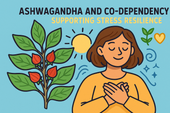
Ashwagandha and Co-Dependency: Supporting Stress Resilience
Stress is more than a feeling—it’s a full-body signal that your system is overwhelmed. When the mind races and the body tenses, your hormones, breathing, and focus all shift into survival mode. Chronic stress doesn’t just affect emotions—it reshapes your nervous system, drains your energy, and clouds your clarity. Learning to understand and manage stress gently is the first step toward peace, balance, and true recovery. 🌿💫
-

Why Co-Dependency Feels Draining: Adrenal Fatigue and Supplements That Help
The adrenal glands are small but powerful organs that sit above your kidneys, acting as your body’s built-in stress managers. They produce hormones like cortisol and adrenaline that help regulate energy, mood, and resilience. When they’re overworked from chronic stress or emotional exhaustion, fatigue and imbalance follow. Supporting adrenal health naturally can help restore calm, energy, and hormonal balance. 🌿⚡
-

The Link Between Anxiety, Co-Dependency, and Natural Support
Anxiety feels like living in constant alert mode—your heart races, your thoughts loop, and your body can’t find peace. It’s the nervous system’s way of preparing for danger, even when none exists. Understanding what’s happening in your mind and body is the first step toward calming the storm and restoring balance. 🌿💫
-

Supplements That Support Dopamine and Serotonin in Co-Dependent Patterns
Serotonin is the neurotransmitter of calm, confidence, and contentment. When it’s balanced, you feel peaceful and emotionally grounded. When it’s low, anxiety, mood swings, and emotional dependence take over. By understanding serotonin’s role in emotional health—and how to support it naturally—you can rebuild inner stability, improve relationships, and cultivate lasting happiness from within. 🌞💫
-

How Emotional Exhaustion in Codependency Impacts the Nervous System
The nervous system is the body’s communication network, connecting the brain to every organ and muscle. It regulates stress, mood, and emotion through a delicate balance of electrical and chemical signals. When overwhelmed, it can become dysregulated—leading to fatigue, anxiety, and emotional imbalance. Understanding how to calm and strengthen the nervous system is key to healing from chronic stress and emotional burnout. ⚡🌿
-

What Is Co-Dependency? The Role of Brain Chemistry and Stress
Stress is more than a feeling—it’s a full-body experience that begins in the brain and ripples through every cell. When cortisol surges and the nervous system stays on alert, your body can’t rest or recover. Over time, this constant tension affects energy, focus, mood, and even immune health. Understanding stress chemistry is the first step toward breaking free from burnout and finding calm again. 🌿
-

Creating a Supplement Stack for Motivation, Energy, and Anti-Procrastination
Motivation is the fuel behind every meaningful achievement—but it’s not just about willpower. It’s a mix of mindset, brain chemistry, and momentum. When energy, focus, and purpose align, action feels natural instead of forced. Learn how to harness motivation as a daily state, not a fleeting feeling.
-

Supplements for Building Consistency and Reducing Chronic Procrastination
Biochemistry is the bridge between biology and chemistry—the science of life at the molecular level. It explains how nutrients, hormones, and neurotransmitters interact to create energy, thought, and emotion. From brain function to muscle movement, biochemistry reveals the invisible processes that sustain health, balance, and vitality.
-

GABA and Procrastination: Supporting Calm Focus for Productivity
GABA is the brain’s natural calming messenger—a neurotransmitter that helps slow mental overactivity and ease stress. When GABA levels drop, focus fades, anxiety rises, and procrastination becomes more likely. By supporting GABA through nutrition, lifestyle, and supplements, you can restore calm clarity, improve focus, and take action with steady, balanced energy.
-

Neurotransmitters and Motivation: Supplements That Support Drive and Focus
Supplements can do more than boost physical health—they can also enhance mental clarity, focus, and motivation. Nutrients like omega-3s, magnesium, B vitamins, and adaptogens help balance neurotransmitters, stabilize mood, and support brain energy. When combined with good sleep, nutrition, and mindful habits, they can transform how your brain performs under stress.
-

How Stress Hormones Like Cortisol Fuel Procrastination (and What Helps)
Blood sugar isn’t just about physical health—it directly impacts focus, mood, and motivation. When glucose levels spike and crash, energy and attention do the same, fueling procrastination and brain fog. Learning how to stabilize blood sugar through balanced meals, mindful habits, and key nutrients helps keep your mind steady, focused, and ready to act.
-

Brain Fog and Procrastination: Supplements for Mental Clarity
Brain fog can turn even simple tasks into mental hurdles. When your thoughts feel slow and unclear, procrastination often follows—making focus and productivity seem impossible. This article explores the biochemical and lifestyle causes of brain fog and reveals the most effective supplements for restoring mental clarity, focus, and sustained energy.
-

The Link Between Low Energy and Procrastination: Can Supplements Help?
Neurochemistry shapes how we think, feel, and act. When neurotransmitters like dopamine, serotonin, and GABA fall out of balance, it can lead to fatigue, anxiety, or lack of motivation—fueling procrastination and low mood. Understanding the brain’s chemical communication system helps us find ways to restore focus, calm, and emotional stability through nutrition, mindfulness, and targeted supplements.
-

Why Do We Procrastinate? The Role of Dopamine and Supplements That Support It
Dopamine is the brain’s motivation messenger—the chemical that fuels focus, reward, and drive. When dopamine levels drop, even simple tasks can feel impossible to start. This article explores how dopamine shapes procrastination, motivation, and mental energy, along with natural supplements and daily habits that help restore balance and get things done.
-

Phosphatidylserine and Stress Reduction for People with BDD
Stress is more than a mental state—it’s a full-body experience that affects hormones, brain chemistry, and emotional balance. For people with Body Dysmorphic Disorder (BDD), constant tension and worry about appearance can overload the nervous system. Learning how stress works and finding ways to calm it is key to breaking the cycle of anxiety and self-criticism.
-

How Antioxidants Like Vitamin C & E Support Mental Health in BDD
Antioxidants are the body’s natural defense against stress and inflammation. For people with Body Dysmorphic Disorder (BDD), oxidative stress can worsen fatigue, anxiety, and emotional imbalance. Nutrients like Vitamin C and E help protect brain cells, boost neurotransmitter function, and support a calmer, clearer mindset—building a stronger foundation for recovery.
-

Ginkgo Biloba and Memory Support for BDD Recovery
Emotional regulation is the foundation of healing from Body Dysmorphic Disorder (BDD). When the nervous system stays in constant overdrive, even small stressors can trigger self-critical spirals. Learning to calm emotional reactivity helps restore clarity, confidence, and a sense of inner balance. By blending mindfulness, nervous system support, and self-compassion, you can retrain your brain to respond—not react—to emotion.
-

Alpha GPC and Cognitive Function in Body Dysmorphic Disorder
Mental fatigue can feel like your brain has hit a wall—thoughts slow down, focus fades, and motivation disappears. For people with Body Dysmorphic Disorder (BDD), chronic overthinking, emotional stress, and constant self-evaluation can deplete mental energy even further. Understanding what causes this cognitive exhaustion is the first step toward recovery—through rest, balanced nutrition, and targeted brain-supporting supplements.
-

N-Acetyl L-Tyrosine and BDD: Supporting Mental Clarity
Chronic stress doesn’t just affect your mood—it reshapes your brain chemistry, weakens focus, and fuels the obsessive thought loops common in Body Dysmorphic Disorder (BDD). Over time, constant cortisol elevation drains mental energy and emotional balance. Learning to recognize and manage chronic stress is essential to restoring mental clarity, self-compassion, and resilience.
-

Chamomile and Lavender for Calming Obsessive Body Image Thoughts
The nervous system is the command center of our emotional and physical world—and in Body Dysmorphic Disorder (BDD), it often operates in overdrive. Understanding how the brain and body communicate under stress reveals why intrusive thoughts feel uncontrollable. Learning to regulate the nervous system through calm practices, nutrition, and supplements helps restore inner balance and emotional safety.
-

Adaptogens for Body Dysmorphic Disorder: Rhodiola, Ginseng, and More
Rhodiola rosea, often called the “golden root,” is an adaptogenic herb renowned for boosting stress resilience and mental endurance. For individuals with Body Dysmorphic Disorder (BDD), Rhodiola may help reduce fatigue, regulate cortisol, and enhance emotional balance. By supporting both mind and body, this powerful plant promotes calm focus, improved mood, and renewed energy to face daily challenges.
-

B Vitamins for Stress Resilience in BDD: Rebuilding Calm from Within
Biochemistry is at the heart of every thought, emotion, and reaction we experience. In Body Dysmorphic Disorder (BDD), chemical imbalances in neurotransmitters like serotonin, dopamine, and GABA can amplify stress and distort self-perception. Understanding the biochemistry behind mood and stress regulation offers a path toward healing—bridging the gap between emotional experience and the body’s molecular balance.
-

Melatonin and Body Dysmorphic Disorder: Restoring Healthy Sleep Patterns
Melatonin, the body’s natural sleep hormone, plays a vital role in helping people with Body Dysmorphic Disorder (BDD) restore healthy sleep cycles. When anxiety and obsessive thinking interfere with rest, melatonin levels often drop, leading to more emotional reactivity and distorted self-perception. This article explores how melatonin works, why BDD disrupts it, and how natural supplementation—combined with mindful routines—can help the brain and body finally find calm at night.
-

Sleep Struggles with BDD: Supplements for Rest and Recovery
When you’re living with Body Dysmorphic Disorder (BDD), restful sleep can feel impossible—but the right supplements can help reset your body’s natural rhythm. From magnesium and L-theanine to 5-HTP and ashwagandha, these nutrients support relaxation, lower cortisol, and enhance melatonin production. This article explores how supplements can calm the mind, ease nighttime anxiety, and promote true restorative sleep for emotional and physical recovery.
-

5-HTP and Serotonin Balance: Could It Help with Body Dysmorphic Disorder?
Anxiety can feel like a storm inside the mind—restless, overwhelming, and hard to control. In people with Body Dysmorphic Disorder (BDD), anxiety often fuels obsessive thoughts and self-criticism, creating a painful cycle of worry and self-doubt. This article explores the biological roots of anxiety, the role of neurotransmitters like serotonin and GABA, and how natural strategies such as mindfulness, supplements, and nervous system regulation can restore calm and mental clarity.
-

Can Ashwagandha Help Ease Stress and Anxiety in Body Dysmorphic Disorder?
Neurotransmitters like serotonin, dopamine, GABA, and acetylcholine are the chemical messengers that shape how we think, feel, and react to stress. In Body Dysmorphic Disorder (BDD), imbalances in these neurotransmitters can amplify anxiety, obsessive thinking, and emotional distress. This article explores how restoring healthy brain chemistry through nutrition, supplements, and mindfulness can help bring clarity, calm, and emotional stability.
-

L-Theanine for BDD: Finding Calm in the Mind
Neurochemistry plays a central role in how we think, feel, and see ourselves. For those living with Body Dysmorphic Disorder (BDD), imbalances in neurotransmitters like serotonin, dopamine, and GABA can intensify anxiety, obsessive thoughts, and emotional distress. This article explores how regulating brain chemistry through supplements, mindfulness, and lifestyle changes can bring the nervous system back into harmony and restore inner calm.
-

Omega-3 Fatty Acids and Body Image Disorders: Supporting Emotional Health
Omega-3 fatty acids do far more than support heart health—they nourish the brain, stabilize mood, and may ease the emotional turbulence tied to body image disorders like BDD. This in-depth article explores how omega-3s regulate serotonin, dopamine, and inflammation, helping individuals reduce obsessive thoughts and rebuild self-acceptance. It also connects nutrition to therapy, mindfulness, and nervous system balance for holistic emotional healing.
-

Magnesium and BDD: Calming an Overactive Nervous System
Magnesium plays a crucial role in calming an overactive nervous system—something people with Body Dysmorphic Disorder (BDD) struggle with daily. This article explores how magnesium supports relaxation, emotional regulation, and stress reduction while diving into the science behind its connection to brain chemistry. It also examines how combining magnesium supplementation with therapy and breathwork can help rebalance the body’s stress response, reduce obsessive thought patterns, and promote lasting nervous system calm.
-

The Gut-Brain Axis and BDD: Why Probiotics Might Matter
The gut and brain are constantly in conversation — and that dialogue may shape how you experience Body Dysmorphic Disorder. By nurturing your microbiome with probiotics, prebiotics, and gut-healing nutrients, you can help rebalance serotonin, calm anxiety, and restore emotional stability from within 🧠🦠.
-
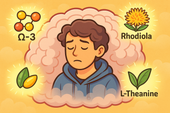
Brain Fog and Body Dysmorphic Disorder: Can Nootropic Supplements Help?
Brain fog often accompanies Body Dysmorphic Disorder, clouding focus and deepening emotional fatigue. Nootropic supplements like L-theanine, Rhodiola, and CoQ10 can help restore mental clarity, balance neurotransmitters, and bring calm energy back to the mind 🌿🧠.
-

How Stress Hormones Like Cortisol May Worsen Body Dysmorphic Disorder
Chronic stress floods the brain with cortisol — the hormone that keeps you on high alert. In Body Dysmorphic Disorder, this chemical overdrive fuels anxiety, distorts self-image, and traps the body in survival mode. Calming cortisol helps restore both peace and perspective 🌿🧠.
-

The Role of Neurotransmitters in BDD—and How Supplements May Help
Neurotransmitters like serotonin, dopamine, glutamate, and GABA shape how people with Body Dysmorphic Disorder perceive themselves. When these brain messengers fall out of balance, perception distorts — but targeted supplements can help restore calm, focus, and emotional regulation 🧠🌿.
-

What Is Body Dysmorphic Disorder? A Deeper Look at the Mind-Body Connection
Body Dysmorphic Disorder (BDD) isn’t just about appearance — it’s about perception. When brain chemistry, trauma, and stress distort self-image, the mind begins to see flaws that aren’t truly there. Healing starts by calming the nervous system and reconnecting mind and body 🪞🧠.
-
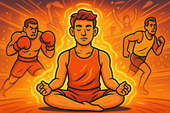
Keeping Calm in Competitive Sports: How to Train Your Mind, Body, and Chemistry for Peak Performance
Competitive pressure can overwhelm even the strongest athletes — but calm is trainable. By combining supplements like magnesium, L-theanine, and adaptogens with breathwork and mindset training, you can stay focused, balanced, and in control under any level of stress 🧠🏅.
-

Supplements for Parents Facing Toddler Tantrums: Staying Calm When Little Emotions Run Wild
Toddler tantrums can drain even the most loving parent — but your calm is powerful. With the right supplements like magnesium, L-theanine, and ashwagandha supporting your nervous system, you can stay patient, grounded, and kind, even when emotions run high 🧸🌿.
-

Workplace Stress and Anger Management Support
Workplace stress can quickly turn into frustration — but calm is a skill you can train. By combining supplements like magnesium, L-theanine, and adaptogens with breathwork and mindset tools, you can stay focused, patient, and emotionally grounded no matter how intense the office gets 💼🌿.
-

How to Stay Patient With Family During Stressful Holidays
Holiday gatherings can stir up old stress and test your patience — but calm is possible. With nervous system support from magnesium, L-theanine, and adaptogens, plus mindful breathing and clear boundaries, you can stay centered, kind, and grounded even when family chaos unfolds 🎄💞.
-

Supplements to Keep Calm During Traffic Jams
Getting stuck in traffic doesn’t have to ruin your mood. With calming supplements like magnesium, L-theanine, and ashwagandha, you can train your body to stay relaxed and focused behind the wheel — turning gridlock into a moment of grounded patience 🚗🌿.
-
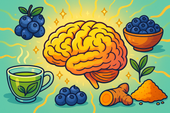
The Role of Antioxidants in Healing Brain Stress from Dissociation
Antioxidants protect the brain from the oxidative stress caused by trauma and dissociation. By neutralizing free radicals and supporting mitochondrial recovery, they help restore clarity, focus, and emotional balance — allowing the mind to heal at the cellular level 🌿🧠.
-
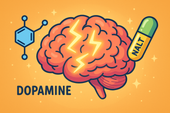
N-Acetyl L-Tyrosine (NALT) for Supporting Mental Clarity
N-Acetyl L-Tyrosine (NALT) fuels dopamine production — the neurotransmitter of focus and motivation. By supporting brain chemistry during stress, NALT helps restore mental clarity, energy, and alertness, making it easier to think clearly and feel present again ⚡🧠.
-

How Ginseng May Improve Focus and Energy in Dissociation
Ginseng helps combat the mental fatigue and fog that often come with dissociation. By supporting mitochondrial energy, balancing neurotransmitters, and regulating cortisol, it gently restores focus, motivation, and emotional presence — helping the mind reconnect with clarity and strength 🌿⚡.
-
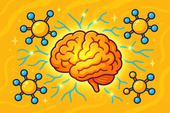
Phosphatidylserine and Dissociation: Supporting Cognitive Function
Phosphatidylserine helps calm the stress response by balancing cortisol, the body’s primary stress hormone. By lowering cortisol spikes, it protects memory, focus, and emotional stability — restoring clarity and mental presence for those struggling with dissociation 🧠🌿.
-
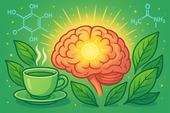
Can Green Tea Extract Help with Dissociative Brain Fog?
Green tea extract may help lift dissociative brain fog by supporting neurotransmitter balance, reducing inflammation, and enhancing energy at the cellular level. With its key compounds EGCG and L-theanine, it promotes calm focus, clarity, and emotional presence — helping you feel more alert and grounded 🍵🧠.
-
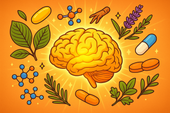
Building a Natural Supplement Stack for Dissociation Support
Building a supplement stack for dissociation means nourishing the brain and body back into communication. By supporting neurotransmitters, gut health, and energy balance through nutrients like magnesium, omega-3s, curcumin, and probiotics, you can help restore clarity, calm, and connection — one layer at a time 🌿🧠.
-

Chamomile and Lavender for Dissociative Anxiety Relief
Chamomile and lavender work together to calm dissociative anxiety by soothing the nervous system and restoring emotional safety. Their natural compounds balance cortisol, enhance GABA activity, and activate the vagus nerve — helping you feel grounded, connected, and at peace again 🌿💜.
-
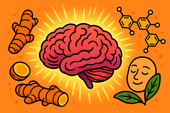
Curcumin for Inflammation and Mental Clarity in Dissociation
Curcumin, the golden compound in turmeric, does more than fight inflammation — it helps clear the mental fog often tied to dissociation. By calming neuroinflammation, balancing neurotransmitters, and supporting mitochondrial energy, curcumin can restore mental clarity, focus, and emotional presence 🌿🧠.
-
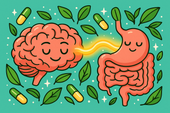
Probiotics and Dissociation: Exploring the Gut–Brain Axis
The gut–brain axis plays a vital role in emotional awareness and presence. When the microbiome is balanced, it supports serotonin production, vagus nerve activity, and calm focus. Probiotics help repair this connection — restoring safety, clarity, and the feeling of truly being in your body again 🌿🧠.
-
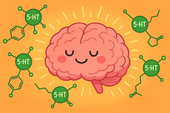
5-HTP for Dissociation: Supporting Serotonin and Emotional Stability
5-HTP helps bridge the gap between emotional numbness and stability by supporting serotonin production — the neurotransmitter that shapes mood, sleep, and sensory awareness. For people experiencing dissociation, 5-HTP may gently restore connection, presence, and emotional balance from the inside out 🌿🧠.

















































